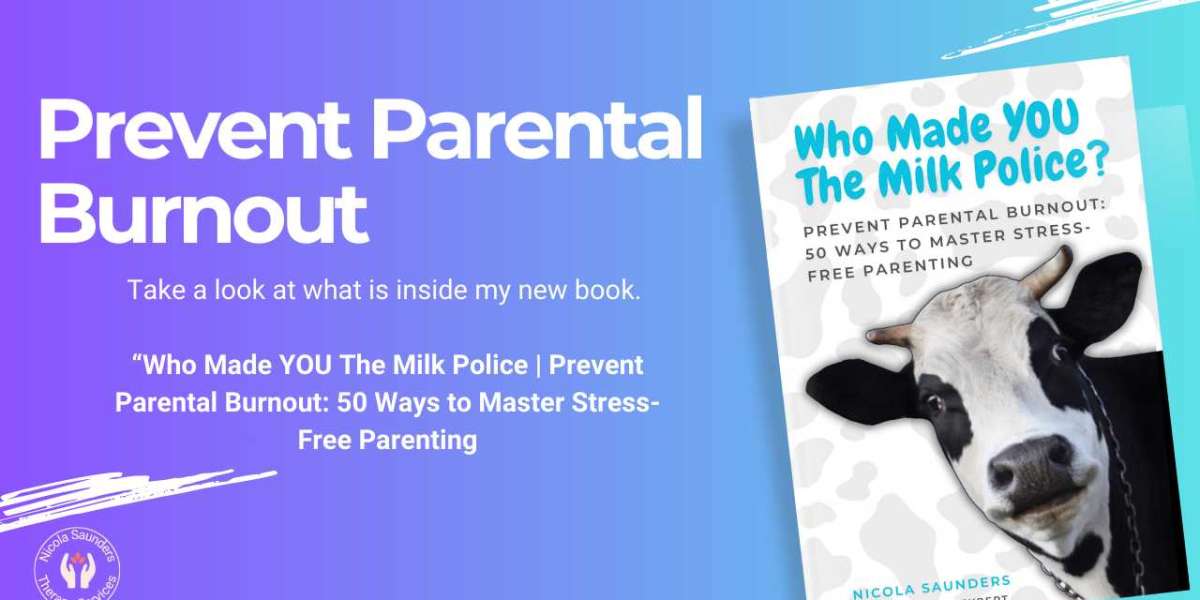The to-do list grows, the demands never seem to stop, and somewhere in between it all, you’ve got this nagging voice in your head reminding you of everything you’ve missed, forgotten, or let slide.
It’s exhausting, isn’t it?
Burnout doesn’t happen overnight. It sneaks in quietly, disguised as just another busy day. One minute you’re handling things well enough; the next, you’re running on fumes, snapping at your kids, and collapsing into bed only to wake up just as tired as you were before. That’s where Who Made You the Milk Police? Managing Parental Burnout: 50 Tips for Stress-Free Parenting comes in.
This isn’t a book about being perfect. It’s about managing life’s chaos while still finding moments of joy, peace, and, dare I say it, fun. If you’ve been feeling like you’re on a hamster wheel that never stops, you’re not alone, and I’m here to walk you through some of the insights and strategies I’ve learned.
What Does Burnout Look Like?
Burnout doesn’t exactly announce itself with a neon sign. Instead, it feels like:
- Waking up after a full night’s sleep and still feeling shattered.
- Losing your temper over tiny things and then feeling guilty about it.
- Constantly feeling behind, no matter how much you do.
Sound familiar? You’re not broken, and you’re not failing. You’re human. And like all humans, you’ve got a limit to how much emotional energy you can give before the tank runs dry.
The Emotional First Aid Box
We ALL need an “Emotional First Aid Box” in our lives. Think of it as your personal toolkit for when life gets a bit too much. Just like you wouldn’t rely on a single plaster for every cut or scrape, you need a variety of strategies to care for your emotional well-being.
Here’s how it works:
- Grab a notebook or a box.
- Start adding items or lists that help you feel grounded, calm, and replenished. This could include:
- A playlist of songs that lift your spirits.
- A list of quick self-care activities (think a ten-minute walk, a cup of tea in silence, or a bit of deep breathing).
- A reminder of something that makes you smile.
What works today might not work tomorrow, and that’s okay. The point is to have options so you’re not scrambling for solutions when stress hits.
Let’s Talk About Stress
Here’s the thing about stress: it’s not always the enemy. In small doses, stress can help us rise to challenges. But when it becomes a constant state of being, something so many of us parents know all too well, it wreaks havoc on our bodies and minds.
Many people say, “I’m stressed,” all of the time and therefore, it becomes a statement of fact. But as it turns out, the language we use matters. When we tell ourselves we’re stressed, our bodies kick into fight-or-flight mode, pumping out cortisol, which, over time, can leave us feeling even more frazzled.
A simple shift in mindset can make all the difference. Try replacing “I’m stressed” with “I’m busy.” It might sound like semantics, but words have power. Saying “I’m busy” feels more manageable and less overwhelming, which can help ease that physiological response.
Why Perfection is a Lie
Hands up if you’ve ever set yourself an impossible standard. As parents, it’s so easy to fall into the trap of thinking we need to have it all together all the time. Perfect house, perfect meals, perfectly behaved children, it’s exhausting just thinking about it.
But here’s the truth: perfection doesn’t exist. Chasing it is like running a marathon with no finish line. You’ll never get there, and in the process, you’ll burn yourself out completely.
Instead, try this mantra: “Doing my best is good enough.”
It might feel awkward at first, especially if you’ve spent years being hard on yourself. But over time, repeating that phrase can help you rewire those perfectionist tendencies.
The Emotional Fuel Tank
One of my favourite metaphors from the book is the idea of an emotional fuel tank. I have used this analogy with almost ALL of my clients over the past 23 years. I have a short 7-minute video on my website that explains the Emotional Fuel Tank in detail, and I cannot tell you how many times clients have come back to me some 10 years later, and they ALWAYS remember the Emotional Fuel Tank. If you want to take a look at the video click here
Think of it this way: every interaction, thought, or task either depletes or refuels your energy. If you’re not careful, that tank can run dangerously low without you even realising it.
To keep things in balance, you need to know what drains you and what fills you up. Relationships, work, parenting, and even your own thoughts can all take energy. On the flip side, activities like a walk in nature, a bit of yoga, or even ten minutes with a good book can refuel you.
Validation is Your Superpower
If there’s one tip I’d shout from the rooftops, it’s this: validation matters. Whether it’s your child upset over a broken crayon or you feeling overwhelmed after a hard day, acknowledging emotions without judgment can work wonders.
Try saying to yourself: “It’s okay to feel this way. I’ve got a lot on, but I’m doing my best.”
And when it comes to your kids, remember this: their big feelings might seem small to you, but to them, it’s their whole world. Validating their emotions doesn’t mean agreeing with every tantrum or whim; it simply means letting them know they’re seen and heard.
Small Changes, Big Impact
The book is full of practical tips for managing stress, and here are a few that have genuinely transformed my day-to-day life:
- Breathe deeply: It’s amazing how something so simple can calm your entire nervous system. (I know, I know, you may be sick of people telling you how to do something which is a natural process that keeps us alive, but HOW we breathe can change how our whole physiological body is coping with life’s pressure, so maybe give it a go)
- Say no: Learning to set boundaries isn’t selfish; it’s essential.
- Celebrate small wins: Did everyone make it out of the house on time? High-five yourself.
- Laugh often: Even a silly TV show or a daft moment with the kids can do wonders for your mood.
- Be kind to yourself: Speak to yourself the way you’d speak to a friend who’s having a hard time.
Breaking the Cycle
Here’s a tough question to sit with: Would you want your child to feel like this as an adult?
If the answer is no, then it’s time to make a change. Children learn how to manage stress by watching us. If we want them to grow up prioritising their well-being, we need to model that for them now.
Final Thoughts
Parenting is messy, chaotic, and often overwhelming. But it’s also beautiful, rewarding, and full of opportunities to grow. You don’t need to be perfect to be a great parent. You just need to be present, willing to learn, and kind to yourself along the way.
So, let’s stop chasing perfection and start prioritising progress.
Let’s build those Emotional First Aid Boxes, refuel our tanks, and remind ourselves every single day that we’re doing our best, and that is more than enough.
You’ve got this. And on the days you feel like you don’t, grab your copy of “Who Made YOU the Milk Police” and remind yourself of what you need TODAY.
Until the 5th of December, I am giving away 10 FREE signed copies of “Who Made You The Milk Police | Prevent Parental Burnout – 50 Ways to Master Stress Free Parenting Click Here to enter
Parenting Through Burnout: Reclaiming Your Energy and Peace
Let’s face it: parenting is hard work. If you’re anything like I was, there are days when you wonder if you’ll ever feel “on top of it all.” The to-do list grows, the demands never seem to stop, and somewhere in between it all, you’ve got this nagging voice in your head reminding you of everything you’ve missed, forgotten, or let slide.
It’s exhausting, isn’t it?
Burnout doesn’t happen overnight. It sneaks in quietly, disguised as just another busy day. One minute you’re handling things well enough; the next, you’re running on fumes, snapping at your kids, and collapsing into bed only to wake up just as tired as you were before. That’s where Who Made You the Milk Police? Managing Parental Burnout: 50 Tips for Stress-Free Parenting comes in.
This isn’t a book about being perfect. It’s about managing life’s chaos while still finding moments of joy, peace, and, dare I say it, fun. If you’ve been feeling like you’re on a hamster wheel that never stops, you’re not alone, and I’m here to walk you through some of the insights and strategies I’ve learned.
What Does Burnout Look Like?
Burnout doesn’t exactly announce itself with a neon sign. Instead, it feels like:
- Waking up after a full night’s sleep and still feeling shattered.
- Losing your temper over tiny things and then feeling guilty about it.
- Constantly feeling behind, no matter how much you do.
Sound familiar? You’re not broken, and you’re not failing. You’re human. And like all humans, you’ve got a limit to how much emotional energy you can give before the tank runs dry.
The Emotional First Aid Box
We ALL need an “Emotional First Aid Box” in our lives. Think of it as your personal toolkit for when life gets a bit too much. Just like you wouldn’t rely on a single plaster for every cut or scrape, you need a variety of strategies to care for your emotional well-being.
Here’s how it works:
- Grab a notebook or a box.
- Start adding items or lists that help you feel grounded, calm, and replenished. This could include:
- A playlist of songs that lift your spirits.
- A list of quick self-care activities (think a ten-minute walk, a cup of tea in silence, or a bit of deep breathing).
- A reminder of something that makes you smile.
What works today might not work tomorrow, and that’s okay. The point is to have options so you’re not scrambling for solutions when stress hits.
Let’s Talk About Stress
Here’s the thing about stress: it’s not always the enemy. In small doses, stress can help us rise to challenges. But when it becomes a constant state of being, something so many of us parents know all too well, it wreaks havoc on our bodies and minds.
Many people say, “I’m stressed,” all of the time and therefore, it becomes a statement of fact. But as it turns out, the language we use matters. When we tell ourselves we’re stressed, our bodies kick into fight-or-flight mode, pumping out cortisol, which, over time, can leave us feeling even more frazzled.
A simple shift in mindset can make all the difference. Try replacing “I’m stressed” with “I’m busy.” It might sound like semantics, but words have power. Saying “I’m busy” feels more manageable and less overwhelming, which can help ease that physiological response.
Why Perfection is a Lie
Hands up if you’ve ever set yourself an impossible standard. As parents, it’s so easy to fall into the trap of thinking we need to have it all together all the time. Perfect house, perfect meals, perfectly behaved children, it’s exhausting just thinking about it.
But here’s the truth: perfection doesn’t exist. Chasing it is like running a marathon with no finish line. You’ll never get there, and in the process, you’ll burn yourself out completely.
Instead, try this mantra: “Doing my best is good enough.”
It might feel awkward at first, especially if you’ve spent years being hard on yourself. But over time, repeating that phrase can help you rewire those perfectionist tendencies.
The Emotional Fuel Tank
One of my favourite metaphors from the book is the idea of an emotional fuel tank. I have used this analogy with almost ALL of my clients over the past 23 years. I have a short 7-minute video on my website that explains the Emotional Fuel Tank in detail, and I cannot tell you how many times clients have come back to me some 10 years later, and they ALWAYS remember the Emotional Fuel Tank. If you want to take a look at the video, there is a link at the bottom of this page.
Think of it this way: every interaction, thought, or task either depletes or refuels your energy. If you’re not careful, that tank can run dangerously low without you even realising it.
To keep things in balance, you need to know what drains you and what fills you up. Relationships, work, parenting, and even your own thoughts can all take energy. On the flip side, activities like a walk in nature, a bit of yoga, or even ten minutes with a good book can refuel you.
Validation is Your Superpower
If there’s one tip I’d shout from the rooftops, it’s this: validation matters. Whether it’s your child upset over a broken crayon or you feeling overwhelmed after a hard day, acknowledging emotions without judgment can work wonders.
Try saying to yourself: “It’s okay to feel this way. I’ve got a lot on, but I’m doing my best.”
And when it comes to your kids, remember this: their big feelings might seem small to you, but to them, it’s their whole world. Validating their emotions doesn’t mean agreeing with every tantrum or whim; it simply means letting them know they’re seen and heard.
Small Changes, Big Impact
The book is full of practical tips for managing stress, and here are a few that have genuinely transformed my day-to-day life:
- Breathe deeply: It’s amazing how something so simple can calm your entire nervous system. (I know, I know, you may be sick of people telling you how to do something which is a natural process that keeps us alive, but HOW we breathe can change how our whole physiological body is coping with life’s pressure, so maybe give it a go)
- Say no: Learning to set boundaries isn’t selfish; it’s essential.
- Celebrate small wins: Did everyone make it out of the house on time? High-five yourself.
- Laugh often: Even a silly TV show or a daft moment with the kids can do wonders for your mood.
- Be kind to yourself: Speak to yourself the way you’d speak to a friend who’s having a hard time.
Breaking the Cycle
Here’s a tough question to sit with: Would you want your child to feel like this as an adult?
If the answer is no, then it’s time to make a change. Children learn how to manage stress by watching us. If we want them to grow up prioritising their well-being, we need to model that for them now.
Final Thoughts
Parenting is messy, chaotic, and often overwhelming. But it’s also beautiful, rewarding, and full of opportunities to grow. You don’t need to be perfect to be a great parent. You just need to be present, willing to learn, and kind to yourself along the way.
So, let’s stop chasing perfection and start prioritising progress.
Let’s build those Emotional First Aid Boxes, refuel our tanks, and remind ourselves every single day that we’re doing our best, and that is more than enough.
You’ve got this. And on the days you feel like you don’t, grab your copy of “Who Made YOU the Milk Police” and remind yourself of what you need TODAY.
Grab yourself a copy TODAY Click here
The Emotional Fuel Tank - Click Here








